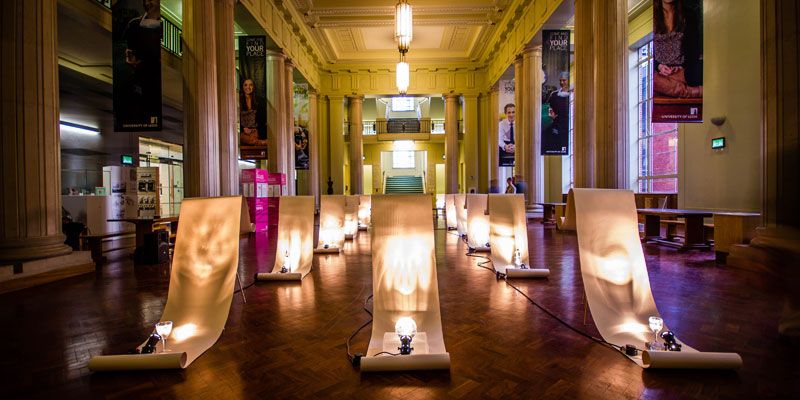
The University of Leeds has today launched its Cultural Institute, strengthening its place in the UK’s cultural and creative economy.
It has three key roles:
- to increase pioneering research collaborations with partners in cultural and creative industry organisations across the city, the region and beyond;
- widen cultural engagement and participation in its artistic endeavours;
- create more opportunities for – and build the skills of – its students.
Setting out the vision for the new institute, Vice-Chancellor Sir Alan Langlands said: “We are redefining what a research-intensive university committed to the twin ambitions of investing in knowledge and creating opportunity looks like in the 21st century.”
Speaking at an event attended by some of the leading lights of the region’s cultural organisations, Sir Alan introduced Arts Council England Chair Sir Peter Bazalgette, who talked about the important role played by universities in arts and culture, citing the example of Leeds’ groundbreaking training for arts sector fundraisers.
He said: “I applaud the leadership that universities such as Leeds are taking in promoting their relationships with the creative and cultural sector to enrich the lives and life chances of everyone – particularly young people.”
During a creative extravaganza, invited guests were treated to a wide selection of performances encompassing opera, drama, dance, poetry, music and film.
Participants and speakers ranged from current students to members of Opera North, South Asian Arts UK, and Yorkshire Dance, giving a global perspective encompassing community filmmaking in a South African township and rediscovered Jewish music and theatre feared lost in the Holocaust.
Other speakers included Richard Mantle, General Director of Opera North, and Sharon Watson, Artistic Director of Phoenix Dance Theatre and chair of Leeds’ bid to be European City of Culture in 2023. The University is the principal academic partner in the bid.
Highlighting the three main purposes of the Cultural Institute, Sir Alan Langlands pointed out that the creative and cultural industries were the fastest expanding sector of the economy, generating £84 billion in the UK in 2015.
He emphasised the potential benefits of research-intensive universities partnering with this sector to address challenges facing society, including those relating to health and wellbeing.
“We are determined that, wherever possible, our research should deliver benefits to society and the economy and have a profound impact on and relevance to people’s lives.”
“We are determined that, wherever possible, our research should deliver benefits to society and the economy and have a profound impact on and relevance to people’s lives,” he said. “The challenges we face have cultural dimensions and solutions – we can’t rely on science alone, every part of the University has to pull together to tackle issues of global concern.”
Professor Frank Finlay, Dean of the Faculty of Arts, Humanities and Cultures, said: “We are taking the lead in building resilient long-term relationships with our partners, with mutual benefits and a genuine exchange of knowledge.
“The Cultural Institute provides a new single point of contact to help even more potential partners access the University’s huge wealth of research talent.”
Professor Finlay added: “The bold aims of the institute will not be achieved from a standing start – the arts and humanities at Leeds are regularly ranked among the best in the world, we are already distinctive for our work in the creative and performing arts, and we have a rich cultural heritage on which to build.”
Sir Alan added: “Put simply, we have more experts working in more fields than most other UK universities, which means we have far more potential to collaborate in innovative ways.
"Of course, we already enjoy many productive collaborations in the creative and cultural sector with organisations both large and small – together we have achieved wonderful things.
“But the new Cultural Institute will transform how we build and sustain partnerships.”
Sir Alan cited the example of a new project to assist in the rehabilitation of stroke survivors by bringing together experts in performance with partners in medicine, robotics, engineering and computing.
Guests at today’s launch also heard about a research partnership between Yorkshire Dance and the University’s School of Biomedical Sciences to investigate the potential benefits of contemporary dance in preventing falls in older adults.
The Vice-Chancellor also addressed the University’s “civic responsibility” to widen cultural engagement and participation with the galleries, museums, archives, public art and artistic venues on campus.
“Put simply, we want to engage with the wider community, including the one on our immediate doorstep, to increase knowledge and enrich people’s lives,” he said. “The Cultural Institute will enhance the University’s position as a beacon for creative innovation, helping to make Leeds an even more exciting and vibrant place in which to live, work and learn.”
The Cultural Institute will also have a key role in creating even more opportunities for students from across the University, providing learning experiences in new environments, volunteering and placement opportunities and inspiration for their own research and creative projects.
Work with the University’s partners could also help shape future courses to ensure students continue to graduate with skills the sector requires.
- To find out more about the work of the Cultural Institute at the University of Leeds, and how to get involved, visit www.leeds.ac.uk/culturalinstitute; email culturalinstitute@leeds.ac.uk or follow @UniLeedsCulture
- Journalists requiring further information should contact Gareth Dant in the University's press office on 0113 343 3996 or email g.j.dant@leeds.ac.uk.